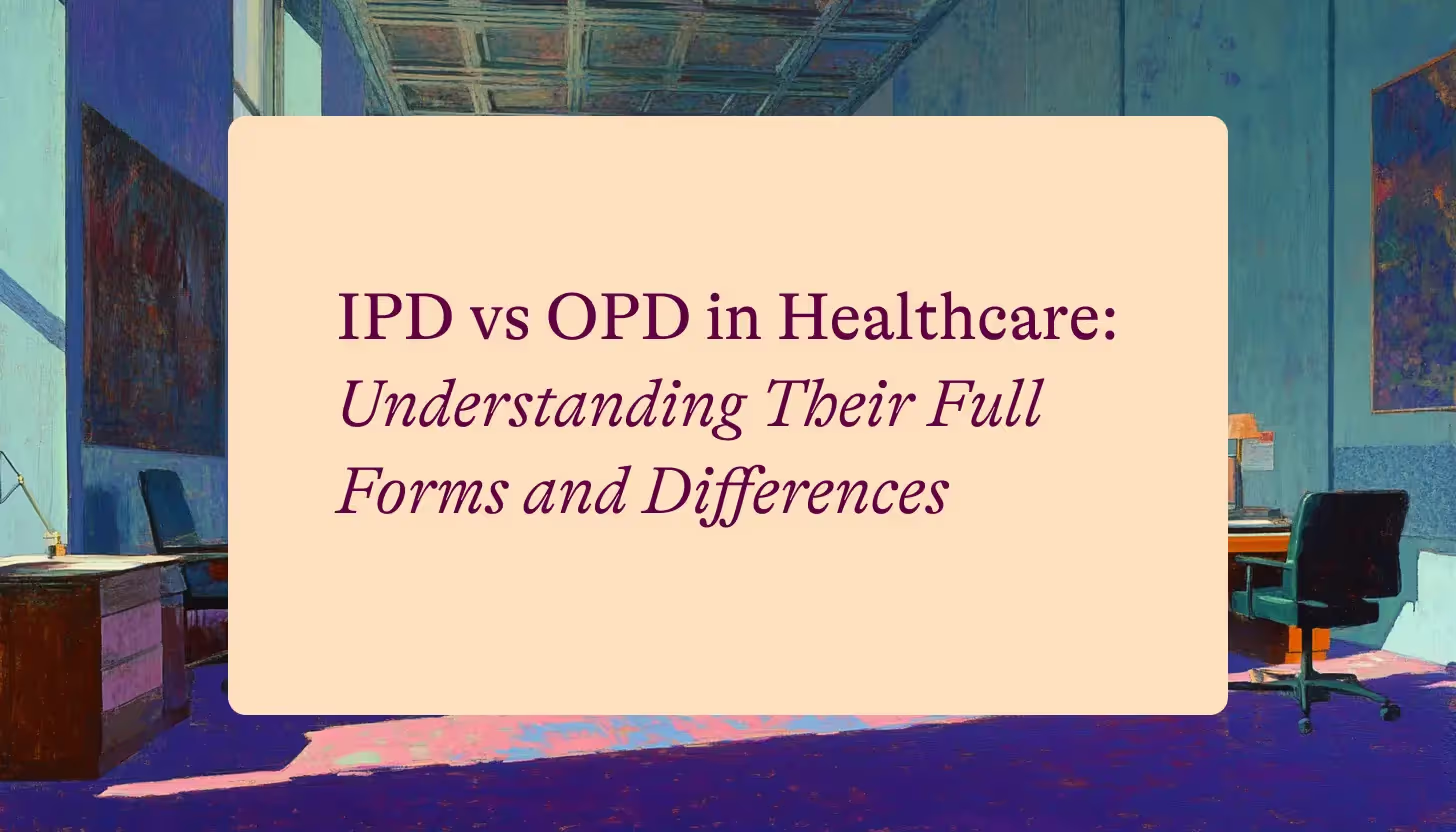Healthcare costs have been on the rise, and unexpected medical emergencies can often lead to financial strain. This is where health insurance comes to the rescue, providing a safety net that helps individuals manage medical expenses efficiently. One critical aspect of health insurance coverage is its coverage of pre-hospitalization and post-hospitalization expenses. In this blog, we'll dive into what these terms mean, the claim process, the benefits they offer, and the necessary documentation.
Also Read: Group Health Insurance Policy for Employees in India, Buy Online
What is Health Insurance?
Health insurance is a contractual agreement between an individual and an insurance provider, wherein the insurer agrees to cover a portion or the entirety of the insured's medical expenses. This coverage extends to a variety of medical procedures, hospitalization, surgeries, and prescribed medications. Health insurance policies are designed to mitigate the financial burden that healthcare costs can impose.
What are Pre-Hospitalization Expenses?
Pre-hospitalization expenses refer to the medical costs incurred by a policyholder before they are admitted to a hospital for treatment. These expenses may include diagnostic tests, consultations, medications, and any other medical services that are necessary to determine the appropriate course of treatment. In many cases, these expenses can add up significantly and impact an individual's finances. Health insurance policies that cover pre-hospitalization expenses help alleviate this financial burden by reimbursing the policyholder for these costs.
What Are Post Hospitalization Expenses?
Post hospitalization expenses encompass the medical costs incurred after a policyholder has been discharged from the hospital. These expenses may include follow-up consultations, prescribed medications, medical tests, and other treatments that are essential for a patient's recovery. Similar to pre-hospitalization expenses, post hospitalization costs can also accumulate and strain an individual's budget. Health insurance policies that offer coverage for post hospitalization expenses ensure that the policyholder can continue to receive the necessary care without worrying about the financial aspect.
Also Read: Group Term Life Insurance Policy for Employees in India, Buy Online
Claim Process - Pre-Hospitalization and Post Hospitalization Expenses
The claim process for pre-hospitalization and post hospitalization expenses is usually straightforward, but it's important to follow the insurance provider's guidelines closely. Here's a general overview of the process:
Pre-Hospitalization Expenses
Collect Documentation: Gather all relevant documents, including medical bills, prescriptions, diagnostic test reports, and consultation receipts.
Submit Claim: Fill out the necessary claim forms provided by your insurance provider. Attach the required documentation and submit the claim within the specified time frame.
Review and Processing: The insurance provider will review your claim along with the supporting documents. If everything is in order, the claim will be processed for reimbursement as per the policy terms.
Post Hospitalization Expenses
Document Medical Expenses: Keep track of all medical expenses incurred after hospital discharge, such as bills for follow-up appointments, medications, and tests.
Submit Claim: Complete the post hospitalization claim form and attach the relevant bills and receipts.
Claim Verification: The insurance company will verify the submitted documents to ensure they meet the policy requirements.
Reimbursement: Upon verification, the insurance provider will process the reimbursement for the approved post hospitalization expenses.
Benefits of Pre & Post Hospitalization Coverage
The inclusion of pre-hospitalization and post hospitalization coverage in health insurance policies offers several advantages:
Financial Relief: These coverages provide financial relief by reimbursing policyholders for the costs associated with medical consultations, tests, medications, and treatments.
Comprehensive Care: Pre and post hospitalization expenses coverage ensures that individuals receive comprehensive medical care that extends beyond the hospital stay.
Reduced Stress: Knowing that medical expenses will be covered eases the stress of managing unexpected healthcare costs.
Focus on Recovery: Individuals can focus on their recovery without worrying about the financial implications of medical expenses.
Cost Savings: These coverages can lead to significant cost savings in the long run, especially for chronic illnesses that require ongoing care.
Documents Required for Pre & Post Hospitalization Claims
When filing claims for pre and post hospitalization expenses, certain documents are typically required:
Pre-Hospitalization Claims:
- Medical bills and invoices for consultations, diagnostic tests, and prescribed medications.
- Prescription slips and treatment plan documents.
- Doctor's certificates detailing the need for hospitalization.
Post Hospitalization Claims:
- Medical bills and receipts for follow-up consultations, tests, and medications.
- Discharge summary from the hospital.
- Any other relevant documents specified by the insurance provider.
Conclusion
In conclusion, health insurance plays a vital role in ensuring individuals can access necessary medical care without the fear of overwhelming expenses. The coverage of pre-hospitalization and post hospitalization expenses enhances the comprehensiveness of health insurance policies. By understanding the concepts, benefits, and claims process associated with these coverages, individuals can make informed decisions when choosing the right health insurance plan. It's important to carefully review policy terms and documentation requirements to ensure a smooth and hassle-free claim experience.
Frequently Asked questions
1. Can I Opt for Pre & Post Hospitalization Coverage Separately in My Health Insurance Plan?
In most cases, pre and post hospitalization coverage are bundled as part of a comprehensive health insurance plan. These coverages are often included together to ensure policyholders receive a well-rounded protection that spans the entire medical journey.
2. Do All Health Insurance Plans Include Pre & Post Hospitalization Expenses Coverage?
Not all health insurance plans automatically include pre and post hospitalization coverage. The extent of coverage varies depending on the type of plan you choose and the insurance provider.
3. Are Cosmetic Procedures Covered Under Pre & Post Hospitalization Expenses?
Pre and post hospitalization expenses coverage typically pertains to medically necessary procedures and treatments. Cosmetic procedures that are not considered medically essential are unlikely to be covered.
4. Is There a Time Limit for Submitting Claims for Pre & Post Hospitalization Expenses?
Yes, there is typically a specified time frame within which you need to submit claims for pre and post hospitalization expenses. Insurance providers often set this time limit to ensure timely processing of claims.
5. Can I Claim Reimbursement for Pre & Post Hospitalization Expenses Even If I Don't Have Cash Receipts?
While cash receipts provide strong evidence for reimbursement claims, not having them doesn't necessarily mean your claim will be rejected. Many insurance providers also accept digital or electronic copies of bills, prescriptions, and other documents as long as they are authentic.
6. How does one determine the extent of pre-hospitalization and post-hospitalization coverage in their health insurance plan?
One can review their health insurance policy document or contact the insurance provider directly. The policy details section and customer service can clarify the extent of coverage for pre-hospitalization and post-hospitalization expenses. This helps in understanding what's included and planning medical expenses accordingly.
7. Are there any restrictions on the types of diagnostic tests or consultations covered under pre-hospitalization expenses?
Yes, health insurance policies may specify restrictions on the types of diagnostic tests or consultations covered. It's essential to check the policy details or consult with the insurance provider. This ensures that you are aware of what tests and consultations are reimbursable under pre-hospitalization coverage.
8. How are ongoing treatments managed under post-hospitalization coverage if they extend beyond the policy's specified time frame for such expenses?
For ongoing treatments extending beyond the specified time frame, it's crucial to communicate with the insurance provider about the necessity of continued care. Some policies may allow extensions under special circumstances. However, this might require additional documentation or approval from the insurer.
.avif)










.avif)














